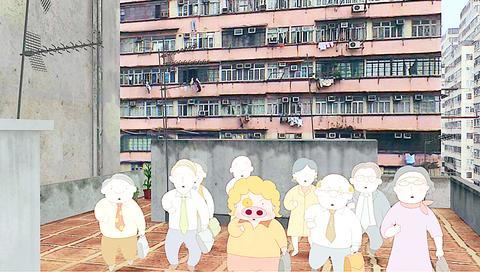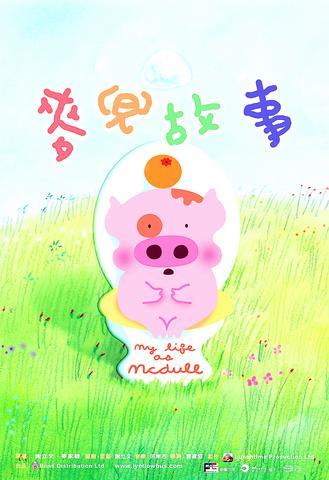McDull is a piglet who lives with his mother in Hong Kong. He is not the brightest kid in his elementary school, his classmates are ducks, turtles and other pigs. His mom, coping on her own, is not the best mom in the world, but tries hard to give McDull a happy childhood. And McDull too tries his best to make her proud, although he constantly fails.
My life as McDull is arguably the best animation feature from Hong Kong in the past five years. Brain Tse (

PHOTO COURTESY OF MATA ENTERTAINMENT
Though just 12 people made the film (none of whom are veteran animators), it took the Grand Prix prize at the Annecy International Animated Film Festival in France for Best Animated Feature Film.

PHOTO COURTESY OF MATA ENTERTAINMENT
It was also the winner of best animation feature film at last year's Golden Horse Awards.
On the whole, the story of Mcdull is a jolly childhood adventure with cute, sometimes bizarre music and songs. The characters (McDull, Mrs. McDull and the classmates) are imaginary animals but the environment is a realistic Hong Kong. The traditional watercolor tones of comics are nicely interwoven with 3D computer graphic animation and sometimes paper cutouts, making the pictures richer than the original comic book.
But the best part of the film is its whimsical style of narration and the imaginative plot that takes you on the different journeys of McDull. Unable to afford a trip to the Maldives, McDull's dream, his mom ends up taking him on a tram trip to Victoria peak. The tram has a sign "Go to the Maldives."
Later, McDull wants to become an Olympic champion and sets his heart on being like female windsurfer Lee Lik-san (
Mrs. McDull (excellent voice by comedy actress Sandra Ng) loves her son so much that she writes a letter to the Olympic committee chairman, hoping to list bun-snatching as an official Olympic competition. This starts up a series of campaigns to include other traditional activities in the Olympics, including tart-tossing. (Clerks in Hong Kong's tea restaurants are famous for their rude service and appear to throw tarts at their customers.)
These cute adventures represent not only the process of growing up, but also, they bring out a local flavor particular to Hong Kong, particularly to that part of the culture that is vanishing.
Looking at McDull growing up makes one think, maybe, there is a bit of McDull in every childhood. We grow with hope and then see failure and realize that not everyone can become a special pig. For this reason, My Life as McDull is an animation not only recommendable to kids but also adults.

Behind a car repair business on a nondescript Thai street are the cherished pets of a rising TikTok animal influencer: two lions and a 200-kilogram lion-tiger hybrid called “Big George.” Lion ownership is legal in Thailand, and Tharnuwarht Plengkemratch is an enthusiastic advocate, posting updates on his feline companions to nearly three million followers. “They’re playful and affectionate, just like dogs or cats,” he said from inside their cage complex at his home in the northern city of Chiang Mai. Thailand’s captive lion population has exploded in recent years, with nearly 500 registered in zoos, breeding farms, petting cafes and homes. Experts warn the

The unexpected collapse of the recall campaigns is being viewed through many lenses, most of them skewed and self-absorbed. The international media unsurprisingly focuses on what they perceive as the message that Taiwanese voters were sending in the failure of the mass recall, especially to China, the US and to friendly Western nations. This made some sense prior to early last month. One of the main arguments used by recall campaigners for recalling Chinese Nationalist Party (KMT) lawmakers was that they were too pro-China, and by extension not to be trusted with defending the nation. Also by extension, that argument could be

Aug. 4 to Aug. 10 When Coca-Cola finally pushed its way into Taiwan’s market in 1968, it allegedly vowed to wipe out its major domestic rival Hey Song within five years. But Hey Song, which began as a manual operation in a family cow shed in 1925, had proven its resilience, surviving numerous setbacks — including the loss of autonomy and nearly all its assets due to the Japanese colonial government’s wartime economic policy. By the 1960s, Hey Song had risen to the top of Taiwan’s beverage industry. This success was driven not only by president Chang Wen-chi’s

Last week, on the heels of the recall election that turned out so badly for Taiwan, came the news that US President Donald Trump had blocked the transit of President William Lai (賴清德) through the US on his way to Latin America. A few days later the international media reported that in June a scheduled visit by Minister of National Defense Wellington Koo (顧立雄) for high level meetings was canceled by the US after China’s President Xi Jinping (習近平) asked Trump to curb US engagement with Taiwan during a June phone call. The cancellation of Lai’s transit was a gaudy